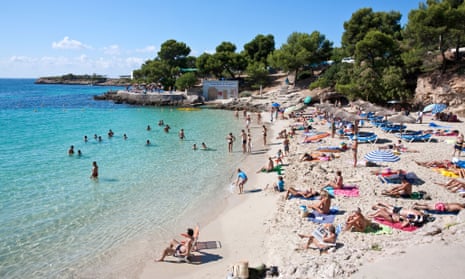The cost of treating British people who become ill while travelling in Europe is five times higher than the cost of treating ill visitors from other European countries in the UK, official figures show.
The Department of Health data, obtained under the Freedom of Information Act, shows that it cost £30m in 2013-14 to meet the costs of European visitors using the National Health Service. This is less than one-fifth of the £155m cost to other states in the European single market for treating ill British tourists.
The figures for costs are for the medical treatment of European Economic Area tourists under the European health insurance card (Ehic) and cover visitors rather than residents or temporary migrants, but critics say they “puncture a big hole” in claims that health tourism is costing Britain dearly.
A £200-a-year health “surcharge” was introduced this week for all new migrants from outside the EEA who stay in the UK for longer than six months. The surcharge, which is £150 a year for overseas students, is payable upfront andcovers migrants for the duration of their visa.
Ministers have said the Department of Health is working on plans to charge those non-EU patients who are not subject to the health surcharge 150% of the cost of NHS treatment. EU migrants working in Britain pay for NHS treatment through their tax and national insurance contributions.
The detailed DoH figures show that Spain and France, the most popular European holiday destinations for British tourists, had the largest bills, nearly £40m each, for their medical treatment. French tourists cost the NHS almost £5m, while those from Spain incurred costs of only £3m under the Ehic scheme.
One explanation for the gap is possibly that Britain has a poor record in recovering the cost of treating European nationals under the scheme. The DoH has said that the £30m figure may be less than 20% of the total estimated chargeable costs.
But the pattern could be also taken to reflect the greater flow of British tourists to other European countries, and the age of British visitors to countries such as Spain, who are more likely to require medical treatment during their visit.
The gap is largest in the cases of Austria and Germany. Austria’s health service spent 43 times more – £5.6m – on treating British travellersthan the NHS did on those from Austria – £130,000. Germany, which is visited by 2 million Britons every year, had to pay 34 times more than the NHS – £22m compared to £643,000.
The largest bills faced by the NHS under the scheme are for visitors from Ireland (£9.3m), France (£4.8m), Belgium (£3.6m), Spain (£3m), the Netherlands (£1.6m), Italy (£1.2m) and Poland (£1.3m).
The figures include other EU nationals going back home from the UK for treatment, so the £5m cost of British people travelling to Poland will include a significant number of Polish nationals. But this means they present a greater cost to the Polish health service than they do to the NHS.
Only four countries appear to have spent less on treating British visitors than the NHS did on their nationals. They are Bulgaria, Latvia, Romania and Lithuania. Taken together they cost the UK £1.6m in health treatment, which is just over 5% of the total bill.
Giles Goodall, the chair of the Brussels and European Liberal Democrats, said: “These figures are further evidence that free movement is a two-way street from which the UK benefits as much as – and in some cases more than – anyone else. They also puncture a big hole in claims that Britain is submerged by ‘health tourists’ – if anything, it seems to be the other way around.
“With 42 million visits by Brits to other EU countries every year, it is clear that we are one of the biggest users of the right to travel freely in Europe – a benefit of our EU membership that the Tories and Ukip would put at risk,” he said.
A DoH spokesman said that for several countries the cost to the UK for medical care equivalent to those incurred by the use of an Ehic are calculated by mutually agreed formulae, rather than the use of the cards themselves. “The costs incurred for medical care in the UK include costs under these formulae agreements.”








Comments (…)
Sign in or create your Guardian account to join the discussion